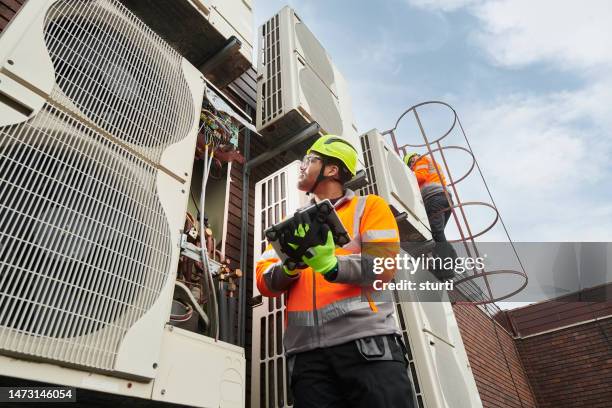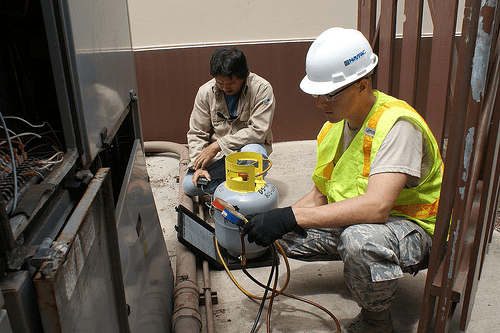Selecting Equipment for heat pump installation ooltewah tn
Selecting Equipment for heat pump installation ooltewah tn
Blog Article
Selecting In Between a Heatpump and Heating System: Key Considerations for Your A/c Requirements
When evaluating heating choices for heating and cooling needs, the choice in between a heatpump and a heating system can be complex. Each system provides unique advantages customized to certain climates and power efficiency objectives. Recognizing these distinctions is essential for making an enlightened option. Trick elements such as installation expenses and environmental impact better make complex the choice process. Which alternative genuinely straightens with one's comfort and sustainability choices? The complying with sections will certainly check out these factors to consider carefully.
Comprehending Heat Pumps: Just How They Function and Their Benefits
While many homeowners think about various home heating alternatives, comprehending how heat pumps function and their benefits can considerably affect their decision. Warm pumps operate by moving heat instead of generating it. In the winter months, they remove warmth from the outside air or ground and move it inside, while in the summertime, they reverse this procedure, cooling the home by getting rid of warmth outside. This dual performance makes them functional for year-round climate control.One of the main advantages of heatpump is their power effectiveness. They make use of significantly much less electrical power contrasted to standard heater, potentially leading to reduced energy bills (heat pump service). In addition, warmth pumps have a smaller sized carbon footprint, making them an ecologically friendly selection. They also need less maintenance than traditional systems, adding to long-lasting expense savings. Generally, comprehending the auto mechanics and benefits of heatpump can assist property owners make informed decisions concerning their heating and cooling down requirements
Checking Out Heating Systems: Types, Operation, and Advantages
Heaters come in various kinds, including gas, electrical, and oil models, each with distinct operational mechanisms. Comprehending these distinctions is crucial, as they influence efficiency and heating performance. Additionally, heating systems supply many advantages, such as regular heat output and dependability in chillier climates.
Kinds of Heating systems
Heater can differ substantially in design and procedure, with furnaces being a popular choice among homeowners. There are numerous kinds of heating systems, each utilizing different fuel sources and modern technologies. Gas heating systems prevail, leveraging gas to create warmth successfully. Electric heating systems, on the various other hand, make use of electric resistance to produce warmth, usually preferred for their straightforward setup. Oil heating systems, while much less typical, work in areas with minimal gas accessibility (heat pump service). Additionally, condensing heaters maximize power effectiveness by recycling and recording exhaust gases. Each kind runs with a system of heat exchangers and ductwork to disperse cozy air throughout a home. Recognizing the distinctions in between these heater types is essential for educated a/c choices
Benefits of Heating systems
For property owners looking for reliable heat throughout cold months, the advantages of heaters are considerable. Furnaces supply consistent heating, ensuring even temperature levels throughout the home. They are especially effective in extreme cool, typically outperforming warmth pumps in cold conditions. Different kinds, consisting of gas, electrical, and oil heaters, use adaptability to satisfy diverse needs and preferences.Furnaces also tend to have reduced initial installation expenses compared to heatpump, making them a more available choice for many. Their robust design adds to a longer lifespan, with numerous systems lasting over 15 years with appropriate maintenance. Furthermore, modern furnaces are often furnished with sophisticated innovation for improved efficiency, which can result in decreased energy bills. Overall, furnaces continue to be a dependable option for efficient home heating.

Energy Efficiency: Comparing Warm Pumps and Furnaces
When comparing energy efficiency in between heatpump and furnaces, the Seasonal Power Performance Proportion (SEER) plays an important function in identifying efficiency. In addition, a functional price analysis reveals the long-term economic effects of each system. Recognizing these variables can assist home owners in making notified decisions regarding their heating services.
Seasonal Power Performance Proportion
Power effectiveness plays a necessary function in the decision-making process between warmth pumps and heating systems, specifically when considering the Seasonal Power Efficiency Proportion (SEER) This metric steps the cooling efficiency of heatpump over a whole cooling season, giving a standard method to assess efficiency. Greater SEER scores indicate higher energy performance, converting to reduced power usage and lowered utility costs. In contrast, heaters are generally assessed utilizing the Yearly Fuel Application Effectiveness (AFUE) score, which mirrors heating performance. When contrasting these 2 systems, house owners ought to focus on SEER ratings for heatpump, as they directly influence overall power savings and environmental sustainability. A thorough understanding of SEER can notably affect the long-lasting satisfaction and cost-effectiveness of the picked heating and cooling solution.
Operational Expense Evaluation
Understanding the functional prices connected with heatpump and furnaces is vital for house owners examining their options. Heat pumps generally supply greater power effectiveness, transforming electrical energy into warm with marginal waste. This leads to lower month-to-month energy costs, specifically in modest climates. Conversely, conventional heating systems, specifically gas versions, may have lower in advance prices yet can sustain greater functional expenditures with time as a result of sustain costs and effectiveness ratings.Moreover, heatpump can function as both home heating and cooling down systems, potentially decreasing the demand for different heating and cooling systems. While preliminary investments for heat pumps may be greater, their lasting financial savings in power efficiency can make them a more cost-effective choice for several households. Mindful analysis of neighborhood power prices is vital to determine the very best option.
Setup Prices: What to Anticipate for each and every Furnace
Installment costs for home heating systems can vary considerably between heat pumps and heaters, influencing homeowners' choices. Heat pumps usually have greater ahead of time setup expenses, typically varying from $3,500 to $8,000, depending on the device size and complexity of setup. This consists of the exterior unit, interior handling system, and necessary ductwork alterations. Conversely, heaters have a tendency to have lower initial expenses, averaging in between $2,500 and $6,000, which can be appealing for budget-conscious property owners. Installment expenses can enhance if comprehensive ductwork is required.Moreover, the choice of gas type for heating systems-- all-natural gas, gas, or electrical-- can also affect installment prices. While warmth pumps supply power efficiency, their initial financial investment might deter some buyers. Eventually, examining installment prices together with long-term cost savings and effectiveness will certainly assist homeowners in making informed decisions regarding their heater.
Environment Factors To Consider: Which System Performs Better in Your Location
Just how do climate problems affect the effectiveness of furnace? The performance of heatpump and furnaces can vary significantly depending upon the regional climate. In moderate climates, heatpump succeed by effectively moving warmth from the outdoors air, making them an energy-saving choice. However, their effectiveness reduces in incredibly cool temperature levels, where they may have a hard time to remove sufficient warm. Alternatively, furnaces, specifically gas designs, supply trustworthy and regular warmth despite outside conditions, making them more effective in colder regions.In areas that experience milder wintertimes, heatpump can run effectively year-round, giving both heating and cooling. In comparison, areas with extreme winters months commonly take advantage of the toughness of heating systems. Inevitably, comprehending the regional environment is crucial when making a decision in between a heatpump and a heating system, as it straight affects their operational effectiveness and total performance.
Upkeep Needs: Long-Term Look After Heat Pumps vs. Furnaces
While both More hints warmth pumps and heaters need routine maintenance to ensure peak performance, their particular requirements and care regimens differ considerably. Heating systems normally require much less frequent focus, with yearly examinations sufficing to inspect for gas leakages, clean filters, and examine overall capability. Their easier design typically permits straightforward repairs.In comparison, heat pumps necessitate semiannual maintenance as a result of their twin role in heating & cooling. This consists of cleaning coils, checking cooling agent levels, and guaranteeing that both the indoor and outdoor systems function at their finest. Additionally, warmth pump maintenance often includes more elaborate parts, making professional maintenance essential.Neglecting upkeep can bring about reduced efficiency and boosted power expenses for both systems. Inevitably, property owners ought to consider these lasting treatment demands when picking between a heatpump and a heating system, as proactive maintenance can prolong the life-span and performance of either system significantly.
Ecological Influence: Choosing a Sustainable Heating Choice
The ecological impact of heating unit is a critical examination for home owners looking for sustainable choices. Heatpump are usually more energy-efficient than conventional heating systems, as they transfer warm as opposed to produce it, considerably minimizing carbon exhausts. By making use of sustainable power resources, such as air-source or geothermal Get More Information heatpump, property owners can even more minimize their eco-friendly footprint.On the various other hand, gas heating systems emit greenhouse gases and add to air contamination, though they usually provide higher heat result. Developments in technology have actually led to the development of high-efficiency furnaces that lessen emissions.Ultimately, choosing a heating system entails weighing efficiency versus environmental effect. Property owners are encouraged to assess neighborhood power sources and motivations for sustainable systems, making sure a choice that lines up with both personal convenience and environmental obligation. The decision affects not only prompt comfort yet also lasting sustainability and environmental health.
Often Asked Questions
How Much Time Do Heat Pumps and Furnaces Usually Last?
The life-span of warm pumps usually varies from 15 to twenty years, while heaters can last between 15 to three decades. Regular maintenance considerably affects their durability and efficiency in giving home heating solutions.
Can I Utilize a Heatpump in Incredibly Cold Climates?
Heatpump can operate in very cool environments, but their performance lessens as temperature levels decline. In such conditions, extra home heating sources may be essential to maintain comfortable interior temperature levels and guarantee peak performance.

What Is the Noise Level of Heat Pumps Versus Furnaces?
The sound degrees of heat pumps and heating systems vary significantly. Normally, warm pumps operate even more quietly than standard furnaces, making them more suitable for those delicate to seem, while heaters may create louder functional noises during home heating cycles.
Are Warmth Pumps Suitable for Both Cooling And Heating?
Heatpump are without a doubt ideal for both heating & cooling (ductless mini splits). They function by moving warm, offering additional info reliable temperature level control year-round, making them a versatile choice for property owners seeking an all-in-one HVAC solution
What Size Furnace Do I Required for My Home?
Identifying the proper dimension heating system for a home requires evaluating elements such as square footage, insulation quality, local climate, and the home's design. Consulting an expert can assure an accurate analysis and optimal comfort. Warmth pumps generally use higher energy performance, converting electric energy into heat with minimal waste. In moderate environments, heat pumps stand out by successfully transferring heat from the outside air, making them an energy-saving alternative. On the other hand, heaters, especially gas designs, give dependable and constant warmth no matter of outdoor conditions, making them more effective in chillier regions.In areas that experience milder winters months, warmth pumps can run efficiently year-round, giving both heating and cooling. Warm pumps are usually a lot more energy-efficient than conventional heating systems, as they move heat rather than create it, significantly minimizing carbon emissions. By making use of sustainable power resources, such as air-source or geothermal heat pumps, homeowners can even more decrease their ecological footprint.On the various other hand, natural gas furnaces emit greenhouse gases and add to air pollution, though they typically provide higher warmth result.
Report this page